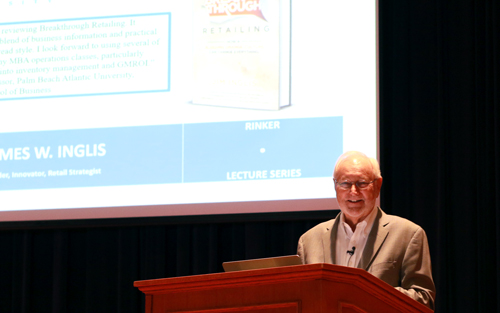
Retired Home Depot executive Jim Inglis still bleeds orange.
Inglis, an award-winning, international retailing guru, shared principles from his new book “Breakthrough Retailing: How a Bleeding Orange Culture Can Change Everything” with students and faculty from the Marshall E. Rinker Sr. School of Business on Thursday. Home Depot’s leadership believed in the company so much that if you cut off their arms, they would “bleed orange,” the signature color, which inspired the name of the book. Inglis’ talk focused on building a strong company culture that leads to financial success.
Dr. Lane Cohee, associate dean of the Rinker School of Business and an associate professor of management, wrote an endorsement for the book. Inglis gave five copies to students who asked questions after the presentation. Inglis, who grew up in Compton, in Los Angeles, worked his way up from a 19-year-old hardware store employee to vice president of the world’s largest home improvement retailer. After 60 years in the industry, he still exudes loyalty to Home Depot, which leads the market and is competitive in online sales, Inglis said.
When Home Depot began, it was considered a “major disruptor” in the home improvement industry, akin to Amazon.com, Inglis said. It put 32 regional companies out of business. The secrets to success were a decentralized organizational structure and associates who were empowered to take care of the customer, Inglis said.
The company’s top leadership operated with principles of servant leadership and celebrated its employees by sharing their success stories, said Inglis, who also serves on the advisory board of Palm Beach Atlantic’s Center for Biblical Leadership.
“Servant leadership creates a great culture that creates great people,” he said.
Those “great people” help maximize profits by building customer loyalty, Inglis said. Customers need to experience on a consistent basis what a brand promises to deliver. The phrase “everyday low price” has no meaning anymore because it’s been so overused that it’s become a cliché, he said. The right price is determined by a customer’s perception.
Maintaining low prices demands low production costs — which means sourcing the best products worldwide without facing hefty tariffs, Inglis said.
“Free trade is the best way that we can raise the standard of living in the world,” he said.
Some companies invest in advertising to bring in foot traffic, and that’s a mistake, Inglis said. The goal of advertising is “changing the customer’s mind forever.”
A company culture creates performance and drives the customer experience that defines a brand, Inglis said, emphasizing the importance of the customer experience, openness to change, and hiring, training and retaining the best employees.
Inglis encouraged students to stay true to business principles and biblical principles to live a purposeful life. They will face pressure to abandon both, he said.
“The truth is defined by biblical principles,” Inglis said. “If you’re not true to your principles, you can get really lost.”


